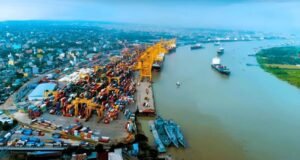
Within just eleven months under the interim government, Bangladesh’s foreign currency reserves have surged from under $20 billion in 2024 to over $31 billion by June 2025, marking a significant recovery in the country’s economic outlook.
According to the latest data from Bangladesh Bank, gross foreign reserves reached $31.72 billion by July 2, 2025. Net reserves, measured under the IMF’s BPM6 standard, currently stand at $26.67 billion.
A major driver behind the rise is a record-breaking inflow of remittances. In the just-concluded 2024–25 fiscal year, remittance earnings hit an all-time high of $30.33 billion — a 26.8% jump from $23.91 billion in FY24. This also surpassed the previous record of $24.77 billion set in FY21, during the COVID-19 pandemic.
In March 2025 alone, $3.29 billion in remittances were sent through the formal banking system — the highest single-month total ever recorded. Over $2 billion flowed in every month throughout FY25.
Officials from the central bank attributed the rise in reserves to several factors, including a decline in money laundering, a stable exchange rate at around Tk 122 per USD, and record growth in exports — reaching $48 billion in FY25.
Speaking to BSS, a senior Bangladesh Bank official highlighted policy reforms initiated by the interim government, noting that measures aimed at tightening financial oversight, boosting institutional stability, and motivating legal remittance channels had paid off.
“Almost eleven months ago, the interim government came to power, promising changes across the board,” the official said. “A number of policy measures have been taken to reform the national economy, organizations, and administration — fostering a stronger system.”
Renowned economist Dr Zahid Hussain, former lead economist at the World Bank’s Dhaka office, stressed that the surge in remittances has been crucial in stabilizing reserves and easing the dollar crisis that had earlier disrupted trade and banking operations.
“Opening letters of credit was difficult. Now things are returning to normal,” Dr Zahid said. He also credited the government’s efforts to reform the banking sector and recover laundered money from abroad.
Dr Zahid cautioned, however, that while signs of recovery are evident, “the crisis is not over yet.”
Abdul Quaium Chowdhury, Deputy Managing Director of Premier Bank PLC, said remittance growth since August 2024 has been a vital relief for the economy. “This has evolved as a critical economic lifeline amid the macroeconomic pressures the nation faced,” he noted.
As Bangladesh moves through this recovery phase, policymakers and economists are cautiously optimistic that sustained reform and continued remittance inflows will further stabilize the economy.
 Weekly Bangla Mirror | Bangla Mirror, Bangladeshi news in UK, bangla mirror news
Weekly Bangla Mirror | Bangla Mirror, Bangladeshi news in UK, bangla mirror news







